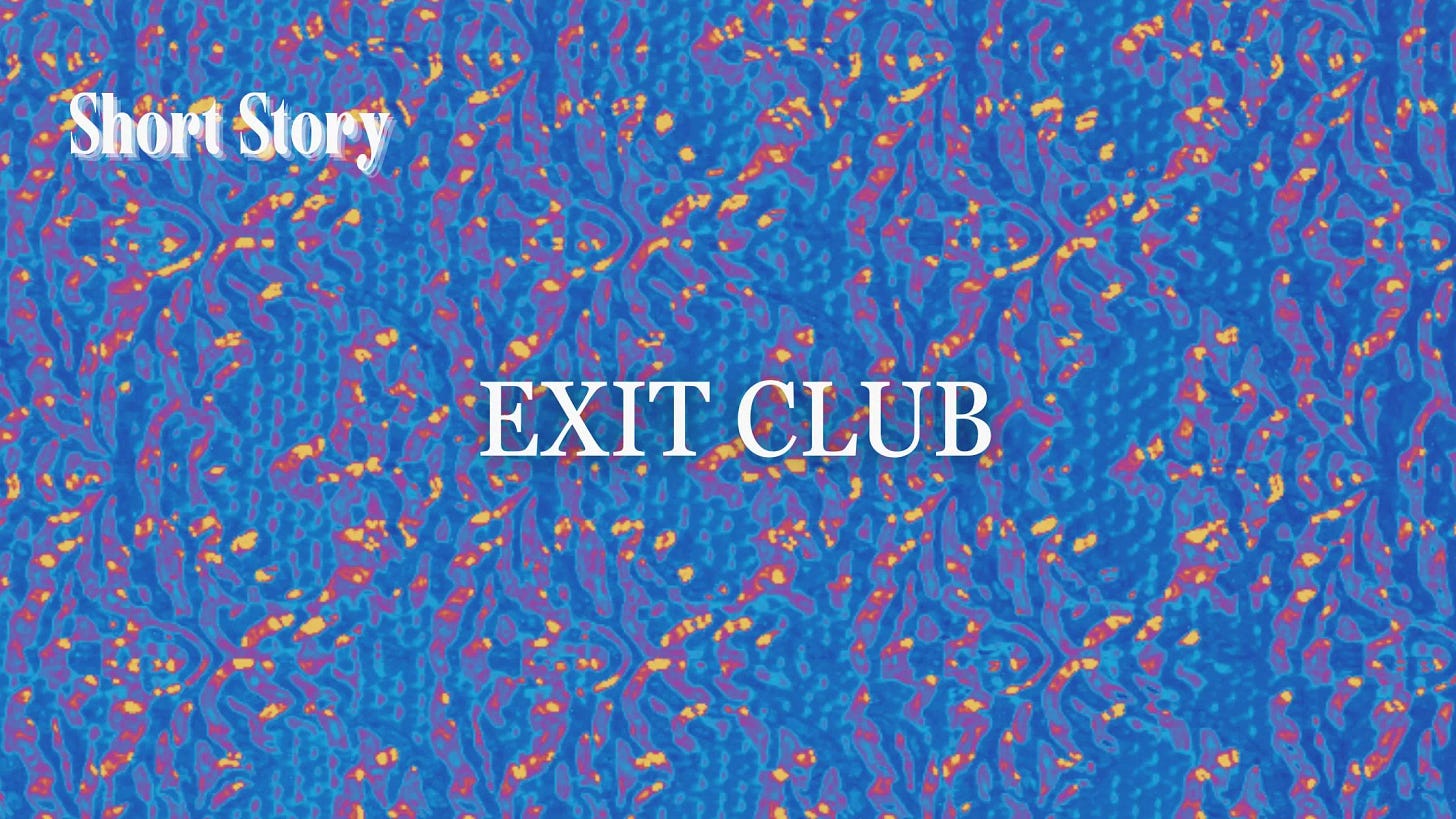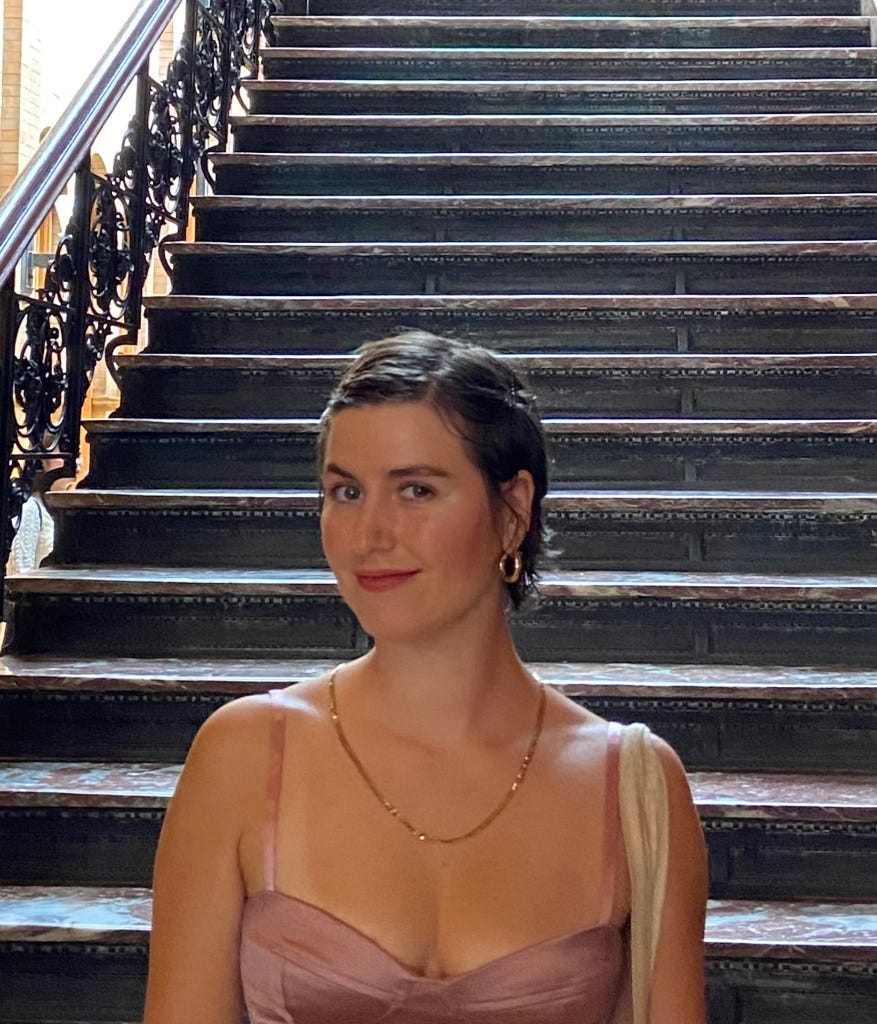double points if you made yourself bigger
Triple points if you didn’t pick up speed.
Hi. Happy post-Easter. Happy warm-weather-returns-to-the-northeast.
I have some thoughts I’ve been noodling on about dystopian fiction and horror, but I’m not quite ready to share them yet, so instead I’m sharing a semi-dystopian horror story from our most recent edition. It’s a story that made me feel heavy when I first read it, and one I can’t get out of my mind.
Expect a theme announcement for our summer edition soon, but we still have so many weeks to revel in the gorgeous writing we published this spring. The daffodils are out, the peonies are nosing their way out of the earth, and the world is on fire. All of these things are true, and somehow they are true at the same time.
To combat, I’ve buried my head in the sand with yet another Anne novel (Anne of Windy Poplars, for those of you keeping track.) Although, I’m also reading Thirst by Marina Yuszczuk, a vampire novel written in a traditional gothic style, replete with pestilence and decomposing bodies. (Delish!) So, maybe it’s all about balance. Or maybe it’s all about extremes. What’s the difference!
See you soon!!
xo,
Monica
By Marley Korzen
Out here, we’re Eastwood and Wayne. Organs are lead, bouncing around in our bodies like Russian roulette. After 10pm, we park our cars on the street where the city is ink-black and gowned in silence.
It is stray cats sniffing for crumbs.
It is meteors skewering the sky.
It is spare blood and mosquitos.
Give us the sharp parts, the uprooted fingernails and bones. Give us the loose arteries of whatever lives here.
We started this game when we were pigtailed and brace-faced. Jude goes first: alleyway. Front stoop of the corner store. The Rottweiler that leapt the fence and chased us down the street.
We count every cavity in the city. Shadows kissing as we poke these hiccups of predation.
\\
With her witch eyes and careless splattering laughter, Jude loves it most when the game picks up speed. You gotta hold yourself better. Stack your spine. Broaden your shoulders. Stop shaking.
My hands are always shaking. I’m plain and gangly—the type of kid nobody wanted on their team. It’s not surprising that Jude is always wins.
Mom’s waiting at the kitchen door when I come home. I sneak around her arms to steal an apple from the counter.
“Rae, enough of this.” She frowns like I’ve been sticking needles in my eyeballs.
“It’s a tradition,” I say, remembering the way she used to get worked up when we’d do hand-clap games that involved crude words. After a few months, she’d forget to care.
“And lock the door!” She says as she hobbles sleepily into her room.
Lock the door. Close the window. I sometimes wonder if these were her first words as a child.
In the morning, Grandma pouts at me from her cereal bowl. “You poor girls have a death wish.” She mutters. She’s not the first to say it. Girls at school whisper that we’re training for some girl gang.
Jude just shrugs, “Fuck ‘em. We’re learning a language that most give up deciphering.”
\\
After dark, another game. The sky and earth are one gaping mouth.
As kids, we’d have sleepovers—devouring the night like a stolen treat. Our parents begged us to sleep, forbid us to ever go out after dark. They tried to take the night away from us.
Running. Sweating. Stomach plunging.
One point for every time you have to race to the other side of the darkened sidewalk because something is charging, alone towards you.
Two points if the something starts to speak.
Three points if the something barks at you: Hey you.
Extra points if it says something about you being a girl. Hey pretty girl. You, girl. Hi, girlie.
\\
Secret gets out. Others join. Girls with cotton candy perfume, butterfly sticker nails, shit-kicker boots and shaved heads. Immediately disqualified if they bring a: lighter, blade, a dog, or pepper spray.
It’s a party. We seize the night like a knife to tongue.
We quickly realize we made a mistake welcoming others in when Jasmine—listerine- blue mullet—switches out a tactical pen at the end of the night.
“How long have you had that?” I hear myself ask.
“I raise you a taser.” Says another girl that wears rhinestones round her eyelids.
Jasmine punches my arm.
“Hit me. I dare you.” She spits. The others go quiet. I know I’ve started something.
“Fuck off.” I say. This isn’t fight club.
“We can’t just walk around, naming the things we see. That’s not self-defense.”
She shoves me hard. My head wallops the pavement. I feel the air go out of my lungs before Jude pulls me back to my feet.
\\
Sandbagged by whiskey, Jude I lie still, like mosquitoes stuck in amber. Our heads rest on the loose gravel of my driveway, teeth chattering as we stare up at the endless velveting night.
God has teeth. No—exit wounds that keep reopening. In our club, we’re confronting death. No—confronting civilization because we are small, oh so very small from here—roly-polies-under-a-rock-small. Spit-from-the-heavens-small.
“You think that my mom is going to handcuff me to my bed one night?” I say aloud. “She’s always waiting for me to come home.”
Jude smiles.
“God, my stepdad hates it when I’m out like this. I keep wondering if I should kill him and then I think about what my mom would do if I did. She’d have no hobbies left.” Exhales loudly. “I can think clearer out here.”
When she looks into the night’s abyss, she sees a blank slate. A resting place for the laughter spilling from her eyes. Jude’s wolflike canines flash as she grins up at Orion’s Belt.
“When I go—I’d like to be a star like that one.” She says.
“That’s not a star, that’s a fucking galaxy.”
“I’ll take a galaxy. I’m too fat to be one star, anyway.” Jude smirks. She’s always saying she’s too fat for this, and too fat for that, which is something she learned from her Botox-injected mother, no doubt. She always surprises me that she’s more focused on this than her sour armpits.
“MAMM! Remember when Miss Thatchenberg called you that in fifth grade?”
We giggle like little girls sharing something so sweet it could rot out all the teeth in our heads.
“Yesss MAMMN!!!” Her voice turns to tinsel, shoving my shoulder.
“She only called you that because you were telling everyone to get in line all the time—“ I shiver.
“—Because someone had to keep the class organized!”
“—And starting parties in the bathroom.”
“Now look at me.” She yawns. “Natural-born rule-breaker…”
\\
Winter comes and Jude arrives with a flowering bruise on her left eye. “What’s—” I begin, but she waves me off.
“Can we just get started?”
Barbed-wire yard. Concrete stoop. Razor news stand. Everything starts to blur from my fatiguing eyes. A lone laugh ricochets through the streets. I beg myself to look for its source, but I’m too tired. I just want to pretend.
I want her to win so badly that my stomach hurts. I’m tired of the game. I’m tired of seeing.
Hands, blue from the cold. Heart, pulped from shattering over and over in fright. Maybe we should have let them take this from us. Maybe it would be easier.
\\
Jude thrusts a pair of stilettos in my hand, and buckles a pair on her own feet.
“Don’t you think this is a bit much?” I argue.
The others shake their heads. “No thanks. I was too close to death last week.” Four of us left.
“If you can’t do it this way, then you can’t play the game.” Jude sighs, dark halos under her eyes.
Ready. Set. Go!
Spine-chills.
How fast can heels go, and what’s the exact speed to get the hell out of there without appearing scared? Count how many street lamps there could be if the city was designed to make you feel safe—
“—No,” says Jude. “No points for dreaming. Only exit plans.”
Count the cars you could pretend belonged to a friend. Open businesses. The moments you did not flinch. Double points if you made yourself bigger. Triple points if you didn’t pick up speed.
A rainfall tonight. No questions asked, we slip on our heels.
Streets oyster-slick. Feet, muddied.
\\
“Do you hear me?” Mom is static. “She’s gone. I knew you shouldn’t be hanging around with her—she was practically begging for something to happen!“
Vomit razors the back of my throat. Chunks of my breakfast hit the toilet bowl.
I hear my mother reiterate on the phone:
“Her step-father. I know…such a sad girl too.”
I want to defend her. I want to rattle off all the ways that Jude was stronger, braver, smarter than anyone I’ve ever met. But I can’t speak.
\\
“I hope you find what you’re looking for.”
Months later, Jude’s mother calls to me from the living room. With the sterile family pictures framed around the house and the neat rows of roses in the yard, the place feels oddly like walking inside a mini fridge purchased from Costco.
Her bedroom is overbearingly bright.
Doorway measurements of her progressing childhood height. Jagged floorboard where she carved her name. Wisps of hair interlaced to a hairbrush by her bed. The metal space heater where the blood from her head—strange that they kept it.
“Did you find anything that’s yours?” Her mother asks when I leave.
\\
On the curb, waiting for her car to make the turn.
Minutes slip.
“I can’t do the club anymore,” I pretend to tell her. “It’s too much. It’s not enough. It’s stupid, frankly. We’re getting too old for these games…”
I want her to shove my shoulder, call me a coward.
It’s here that I see that she was set up to lose. The night knows itself—it is a receded landscape. A single note. We were busy combing something finite because nobody tried to take daylight from us.
It only feels right to give the game one more go.
The universe dislocates, my trained eye sees its cracks and passages.
It’s only when I see a burning amber star winking back at me that I understand—she’s found a new landing to terrorize.
Marley Korzen is a writer based in Santa Barbara, CA, with work featured in MudRoom, Brown University’s The Round, and forthcoming in Bodega and Gone Lawn.



